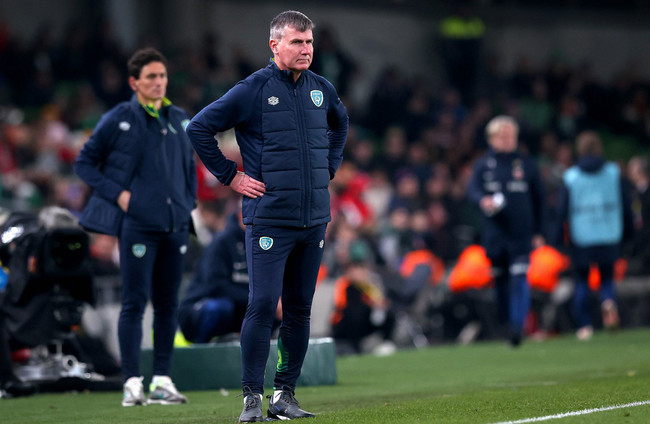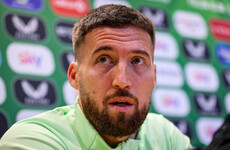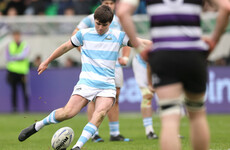AFTER THE FINAL whistle went, Stephen Kenny left his technical area and walked about 15 yards onto the pitch.
He looked towards the Ireland fans streaming out of the South Stand behind the goal where Norway took the lead and Alan Browne had struck a sublime leveller.
Kenny stood alone – Keith Andrews remaining on the touchline – and didn’t engage with players as they headed for the home dressing room. As he returned towards the tunnel, the Ireland manager turned back on a couple of occasions while mustering a kind of applause for those that remained that was a mixture of apologetic and grateful.
Not because Ireland had been humiliated or embarrassed, but perhaps simply because this was not very good and, on another night, maybe boos would have rung around for a performance that was disjointed and lacking in belief for large periods.
No one could have blamed Kenny if he forced change at half time by hauling off any number of his underperforming players.
Instead, he offered a chance at redemption. He was rewarded, to a point, only for the basics to let Ireland down again when Norway struck their 85th-minute winner from a set-piece.
The nature of this haphazard defeat is a reminder that Ireland have yet to emerge from the Jekyll and Hyde phase of Kenny’s tenure.
A performance like this one is cause for concern, another blunt example of how Ireland cannot afford to start games in such a submissive manner and allow it to fester for a whole half.
Browne’s long-range effort in the 65th minute looked as if it might be the springboard for a welcome recovery, but instead of finding the confidence to push for a winner, Ireland were undone by an inability to deal with what a set-piece.
Such failings can only lead to further scrutiny.
The first 45 minutes were atrocious from Ireland and when Norway took a deserved lead through Leo Ostigard, the goal was met by deathly silence in the Aviva Stadium.
Not because the home fans were stunned by the manner of the header, more a case of being dragged into the same kind of stupor which the Ireland players were trudging about Dublin 4.
Maybe this is exactly what to expect from a November friendly when the World Cup begins on Sunday. Imagine what that means for the away trip to Malta at the weekend.
Still, Norway had no issues playing with precision and purpose. That, in no small part, was down to excellent Martin Odegaard, whose two set-piece deliveries lead to the visitors’ goals.
The Norway captain took top billing in the Premier League superstar stakes as a result of Erling Haaland’s absence and the grace with which the Arsenal playmaker operated was a stark reminder of the type of operator which Ireland are lacking.
How often has that point been made?
Regardless, the lack of a creative fulcrum was not the reason for such a turgid opening half.
Even in the build up to Norway’s opener, elements of a disjoined and lethargic Ireland could be traced back 45 or seconds earlier when Callum O’Dowda was easily beaten by Marcus Holmgren Pedersen bursting forward from right back.
The 27-year-old, making his first start for Ireland in two years due to injury and lack of club form, dragged him back sheepishly.
It was small moments like that all around the pitch which fed into the overall malaise. Gavin Bazunu was tentative with his distribution and, one glaring occasion, commanding his box.
A dangerous in swinging free-kick from Odegaard in the 28th minute hit the Southampton goalkeeper in his chest when he came to collect, checked his run and then second guessed himself.
It was a let-off similar to a misplaced pass into the centre of the pitch for Josh Cullen just five minutes previously which, had Haaland been the one on the end of Odegaard’s resulting pass instead of Jorgen Larsen, would surely have ended up in the back of the net.
Callum Robinson and Michael Obafemi struggled in tandem up top, hardly surprising given it’s a partnership given its first outing. Again, though, the trickle down effect of lethargy was evident in the simple things.
Like the 21st minute when Bazunu clipped a pass out to Matt Doherty on the right, the ball floating towards him for an eternity. Instead of anticipating Doherty’s only option – a glancing header on the run into the space in front of Robinson 15 yards away – the Cardiff City man laboured and was beaten to it by his marker.
That is what had to change after the break and it seemed that the message – and maybe how it was delivered – was the catalyst for that reaction.
O’Dowda, timid before the interval, started with the kind of swagger he really should have tried to impose much earlier during his audition for the left-wing back role for the start of the European Championship qualifiers.
His part in Browne’s equaliser, taking on his man and producing a cross near the endline, was a prime example of the ambition and courage which Ireland lacked in the final third.
But the worst damage of all was done their own box when a failure to defend a corner and free-kick caused them.
There were no points on the line yet, as Kenny stood alone on the pitch at full-time, it was a defeat that hurt.












Didn’t know he was on the field until they got the penalty